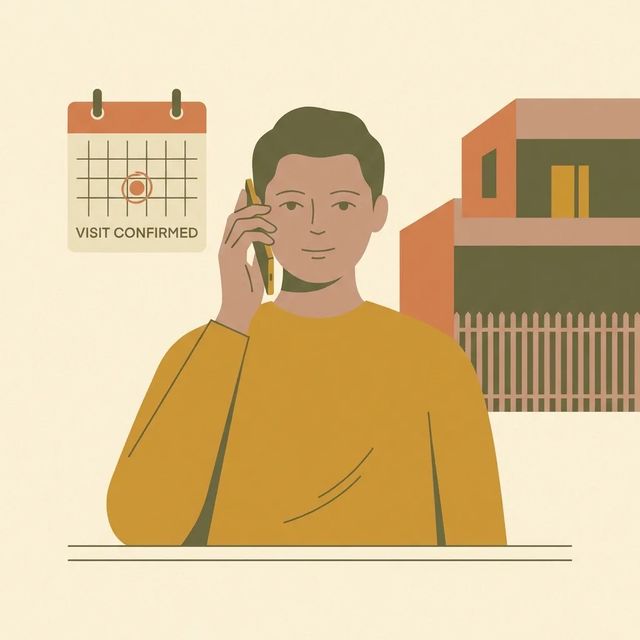Richmond West County Ca, CA
Need to reach someone at Richmond West County Ca? Look up an inmate, send messages or mail, add commissary funds, or schedule a visit.
Explore
Find an Inmate at Richmond West County Ca, CA
Search for a loved one and send messages and photos in minutes.

Guides for This Facility

How to Contact an Inmate at West County Jail (CA)
Trying to reach someone at West County Detention Facility? Start with the main line and plan ahead for any in-person visit. Scheduling and timing trip up most families.
Read Guide
How to Send Money to West County Jail (CA)
Putting money on someone's account at West County Jail is straightforward, but you need to use an accepted method. Send it the wrong way, and your payment comes right back.
Read Guide
West County Jail Visiting Hours & Before-You-Arrive Checklist
Planning a visit to West County Detention Facility? Knowing the exact time blocks and arrival cutoffs will save you a wasted trip. Here's the schedule and a quick checklist to get you through the door.
Read GuideAt a Glance
Visitation
- Up to three visitors may visit an inmate at one time, and all visitors must be scheduled and arrive no later than 30 minutes before the end of any visiting block.
- Inmates must notify the supervising Deputy Sheriff of scheduled visits and report to the visiting area about 15 minutes before the visit.
- Visitors and inmates are responsible for their conduct during visits; violations may lead to termination, suspension, restriction, revocation, arrest, or denial of visiting.
Communication
- The Records & ID Unit is open Monday–Friday, 8 AM–5 PM and provides a contact address, phone, fax, and email for records inquiries.
- The West County Detention Facility listing includes the facility address and main phone number for general contact.
- The Office of the Sheriff may use video‑recording devices in visiting areas, except where confidential attorney consultations occur.
Sending Commissary
- West County Jail accepts inmate funds only as money orders and cashier's checks.
- Personal checks or cash mailed to West County Jail will be returned to the sender.
- The Records Unit requires valid identification and has a ten‑day response period for records requests.
Based on official sources and community feedback.Learn how we verify
Topic Overviews
Visitation
Visiting at West County Jail takes a little planning, but the basics are straightforward. All visits must be scheduled in advance, and the jail allows up to three visitors per inmate at one time. Plan your arrival carefully: you must arrive no later than 30 minutes before the end of a visiting block. The inmate also has responsibilities. They must notify the supervising Deputy Sheriff of scheduled visits and report to the visiting area about 15 minutes beforehand. During the visit, both you and the inmate are responsible for your conduct. Violations can lead to a visit being terminated and may result in suspension, restriction, revocation, arrest, or denial of future visits. The Office of the Sheriff may use video-recording devices in visiting areas, except during confidential attorney consultations.
Read full guideSending Commissary
Sending money to someone at West County Jail is straightforward once you use the right payment type. The jail accepts inmate funds only as money orders or cashier's checks. Any cash or personal checks mailed to the facility will be returned to the sender. Before you send anything, confirm the person's full name and booking or facility ID. Make sure you're using a deposit method the county accepts, since options (online or mobile portals, phone deposits, lobby kiosks, or U.S. Postal money orders) can vary by facility and vendor. Money on an inmate trust account can be used for commissary, phone time, hygiene items, and other approved purchases, but authorized deductions like court-ordered restitution may apply. For Records Unit services, bring valid ID, expect up to a ten-day response window, and pay fees by exact-change cash or check (no credit or debit cards).
Read full guideCommon Questions
Showing 6 of 9How many people can visit an inmate at West County Jail?
Up to three visitors may visit an inmate at one time. All visitors must be scheduled in advance.
VisitationDo I need to schedule a visit in advance at West County Jail?
Yes. West County Jail requires all visits to be scheduled ahead of time, so check the facility’s visit page for the exact scheduling method used.
VisitationCan visits be recorded at West County Jail?
Yes. The Office of the Sheriff may use video-recording devices in visiting areas, except for confidential attorney consultations.
VisitationHow can I call or video chat with someone at West County Jail?
Use the West County Detention Facility’s public listing for the main phone and address for general contact. For video visits or electronic messaging, you’ll typically need to create an account on the department’s communications platform and add prepaid funds through the platform’s payment feature. During provider transitions, use whichever platform the facility currently supports.
CommunicationAre visits or video chats recorded at West County Jail?
The Office of the Sheriff may use video-recording devices in visiting areas, except where confidential attorney consultations occur.
CommunicationHow do I contact the Records & ID Unit and when are they open?
The Records & ID Unit handles records inquiries and is open Monday through Friday from 8 AM to 5 PM. They provide a contact address, phone, fax, and email for records matters. Check the facility's public listing for those contact details.
CommunicationMore Guides
Ready to Connect?
Search for your loved one to start communicating today
Did You Know?
West County Detention Facility (West County Jail) is located in Richmond, California. It opened in 1991. WCDF is a co-educational, program-oriented direct supervision jail.
This guide is based on feedback from 57 families and official facility documentation. Learn how we verify
